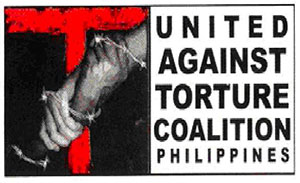History and Status:
The NPM Bill proposed by the United Against Torture Coalition (UATC) and supported by the Commission on Human Rights (CHR) was approved by the Committee on Human Rights in the House of Representatives but did not reach the plenary before the 16th Congress ended on June 30, 2016. The Senate version of the bill was discussed at the Committee of Justice and Human Rights twice at the instigation of the UATC.
When the 17th Congress convened on July 25, 2016, two legislative bills have been filed for the enactment of the NPM: Senate Bill (SB) No. 113 authored by Sen. Aquilino Pimentel III and House Bill (HB) No. 158 authored by Rep. Jose Christopher Belmonte which both seek to establish the National Committee for the Prevention of Torture (NCPT). Two other proposed laws to create an NPM were filed by lawmakers in the House of Representatives.
SB 113 was referred to Senate Committee on Justice and Human Rights on August 2016. The HB 158, on the other hand, is pending at the House Committee on Human Rights since July 7, 2016. Among the salient features of the two legislative bills is the creation of the NCPT separate from the CHR but is attached to the Commission solely for budgetary purposes and, ensure regular and unannounced visits to places of deprivation of liberty.
Balay has already briefed the House Committee on Human Rights about the NPM model that it is proposing. It has also held a lobby meeting with the NPM proponents in the Senate.
Type of Policy Proposed
There are nine core international human rights treaties that make up the current body of international human rights law. Many of the core treaties have ‘Optional Protocols’ which supplement or add to the core treaty and are also legal instruments that have binding obligations forthe State. One of the nine core treaties is the Convention Against Torture, Inhuman or Degrading Treatment or Punishment (CAT). The CAT has anOptional Protocol that is called the Optional Protocol to the Convention against Torture and Other Cruel, Inhuman or Degrading Treatment or Punishment (OPCAT). It is an international treaty aimed at preventing torture and cruel, inhuman or degrading treatment or punishment of persons deprived of their liberty.
The aim of the OPCAT is to assist a State in meeting the legal obligations articulated in the core treaty, the CAT, by establishinga system of regular visits undertaken by independent international and national bodies to places where people are deprived of their liberty in order to prevent torture and other forms of ill treatment.
When a State becomes party to the OPCAT through ratification, it agrees to international inspections of places of detention by the Subcommittee to the treaty called the UN Subcommittee on the Prevention of Torture (SPT). At the national level, each State Party shall set up, designate or maintain at the domestic level one or more ‘visiting bodies’ to prevent torture and other forms of ill treatment called a National Preventive Mechanism (NPM). The NPM must be permitted to conduct inspections of all places of detention, including prisons, juvenile detention, local and offshore immigration detention facilities and other places where people are deprived of their liberty. The focus of the NPM is to assist the government in ensuring the prevention of torture and ill treatment and that the conditions meet international standards in the places where people are deprived of their liberty. This is to be done through routine monitoring and regular dialogue and engagement with the relevant authorities to assist in the identification of challenges, make subsequent recommendations and to provide policy guidance.
Situational Analysis
The Philippines ratified the OPCAT in April 2012. The OPCAT requires that one year after ratification, each State Party tothe treaty mustdesignate and establishone or several independent NPMs. In keeping with the requirements, the Philippines should have established its NPM by May 2013, however the legislative act required to establish the monitoring body remains pending in Congress.
There are many different models of NPMs globally, and the OPCAT allows States to decide what is the best fit for their context, providing that the NPM meets the required role and functions as specified in the treaty. Since 2008, there have been many multi-stakeholder consultations to decide on the most appropriate NPM model for the Philippines spearheaded by Balay and members of the United against Torture Coalition. Two models have been discussed during those consultations over the years: one is the Commission on Human Rights (CHR) would be the designated NPM, and the other would be to establish a new body that would be attached but independent to the CHR. In 2014, Balay – with the support of the Research and Rehabilitation Center for Torture Victims (RCT-Denmark) and the Association for the Prevention of Torture (APT) - organized a consultation on a draft NPM bill that brought together 150 representatives from Government, CHR, and international and national civil society organizations. Succeeding multi-stakeholder study sessions arrived at a consensus that the NPM model would be as new body but “attached” to the CHR. The revised draft NPM bill was submitted to the Human Rights Committee of the Senate and Congress in May 2014 and was approved by the House Human Rights Committee in June 2015. The bill has not yet been considered in the Senate.
Proposed Policy
The conditions set forth by the OPCAT for an effective NPM are as follows. State Parties shall:
- Guarantee the functional independence of the NPM as well as the independence of their personnel;
- Take the necessary measures to ensure that the experts of the NPM have the required capabilities and professional knowledge. They shall strive for a gender balance and the adequate representation of ethnic and minority groups in the country;
- Make available the necessary resourcesfor its effective functioning.
The State Parties shall grant the NPMs, at a minimum the power to:
- Regularly examine the treatment of the persons deprived of their liberty in places of detention with a view to strength, if necessary, their protection against torture and other forms of ill treatment;
- Make recommendations to the relevant authorities with the aim of improving the treatment and the conditions of the persons deprived of their liberty and to prevent torture and other forms of ill treatment, taking into consideration the relevant UN standards;
- Submit proposals and observations concerning relevant existing or draft legislation.
In order to enable the NPM to fulfil its mandate, the States Parties undertake to grant the Mechanism:
- Access to all information concerning the number of persons deprived of their liberty in places of detention, as well as the number of places and their location;
- Access to all information referring to the treatment of those persons as well as their conditions of detention;
- Access to all places of detention and their installations and facilities;
- The opportunity to have private interviews with the persons deprived of their liberty without witnesses, either personally or with a translator if deemed necessary, as well as with any other person who the NPM believes may supply relevant information;
- The liberty to choose the places they want to visit and the persons they want to interview;
- The right to have contacts with the Subcommittee on Prevention, to send it information and to meet with it.
National Policy Constituency
Government line agencies
Commission on Human Rights, Philippines
Members of the United Against Torture Coalition
International organizations
Danish Institute against Torture (DIGNITY)
Association for the Prevention of Torture (APT)
References
- The Convention Against Torture (CAT): http://www.ohchr.org/EN/ProfessionalInterest/Pages/CAT.aspx
- The Optional Protocol to the Convention Against Torture (OPCAT): http://www.ohchr.org/EN/ProfessionalInterest/Pages/OPCAT.aspx
- The Subcommittee on the Prevention of Torture (SPT): http://www.ohchr.org/EN/HRBodies/OPCAT/Pages/OPCATIndex.aspx
- National Preventive Mechanisms (NPMs) including Guidelines:
http://www.ohchr.org/EN/HRBodies/OPCAT/Pages/NationalPreventiveMechanisms.aspx
- Philippines – NPM Designation
http://www.apt.ch/en/opcat_pages/npm-designation-55/
- Philippines proposes new model for its NPM:
http://www.apt.ch/en/news_on_prevention/philippines-propose-new-npm-model/#.V4eF-mckrIU























